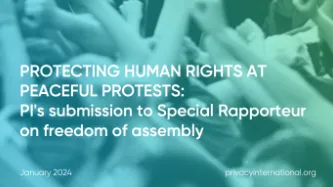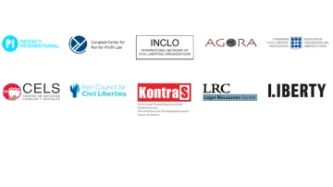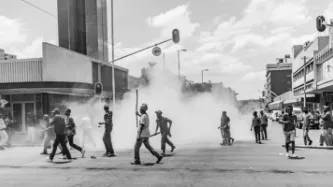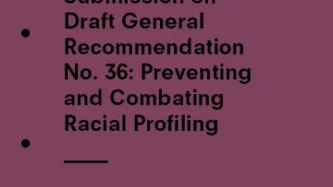Search
Content type: Advocacy
On 18 October 2023, the Inter-American Court of Human Rights (IACtHR or Court) issued a historic judgment declaring the Republic of Colombia internationally responsible for human rights violations against several members of the human rights non-profit Colectivo de Abogados y Abogadas José Alvear Restrepo (CAJAR)and their relatives. This groundbreaking decision marks the first acknowledgment within the inter-American context of a state’s international responsibility for violating the right to…
Content type: Advocacy
Privacy International's response to the call of submissions of the UN Special Rapporteur on the rights to freedom of peaceful assembly and of association on the tools and guidelines which may assist law enforcement in promoting and protecting human rights in the context of peaceful protests. The Special Rapporteur's report will be presented at the 55th session of the UN Human Rights Council.While PI recognises the role of law enforcement can play in facilitating the enjoyment of freedom of…
Content type: Advocacy
Privacy International (PI), the European Center for Not-for-Profit Law (ECNL), International Network of Civil Liberties Organizations (INCLO), Agora, the Canadian Civil Liberties Association, Centro de Estudios Legales y Sociales in Argentina, the Irish Council for Civil Liberties, KontraS in Indonesia, the Legal Resources Center in South Africa, and Liberty in the UK welcome the opportunity to provide input to the global study of the UN Special Rapporteur on the promotion and protection of…
Content type: Press release
In a landmark judgment, handed down today (Monday 30 January 2023), the Investigatory Powers Tribunal have found that there were “very serious failings” at the highest levels of MI5 to comply with privacy safeguards from as early as 2014, and that successive Home Secretaries did not to enquire into or resolve these long-standing rule-breaking despite obvious red flags.Human rights organisations Liberty and Privacy International, who brought this significant legal case in January 2020, have…
Content type: Report
In the months following the beginning of the Covid-19 pandemic, more than half the world’s countries enacted emergency measures. With these measures came an increase in executive powers, a suspension of the rule of law, and an upsurge in security protocols – with subsequent impacts on fundamental human rights. Within this broader context, we have seen a rapid and unprecedented scaling up of governments’ use of technologies to enable widespread surveillance. Surveillance technologies exacerbated…
Content type: Long Read
The defense and protection of the environment continues to come at a high cost for activists and human rights defenders. In 2021, the murders of environment and land defenders hit a record high. This year, a report by Global Witness found that more than 1,700 environmental activists have been murdered in the past decade.
While the issue of surveillance of human rights defenders has received attention, evidence of the surveillance of environmental activists keeps mounting, with recent examples…
Content type: Report
End-to-end encryption (E2EE) contributes significantly to security and privacy. For that reason, PI has long been in favour of the deployment of robust E2EE.Encryption is a way of securing digital communications using mathematical algorithms that protect the content of a communication while in transmission or storage. It has become essential to our modern digital communications, from personal emails to bank transactions. End-to-end encryption is a form of encryption that is even more private.…
Content type: News & Analysis
Around the world, we see migration authorities use technology to analyse the devices of asylum seekers. The UK via the Policing Bill includes immigration officers amongst those who can exercise powers to extract information from electronic devices. There are two overarching reasons why this is problematic:
The sole provision in the Policing Bill to extract information rests on voluntary provision and agreement, which fails to account for the power imbalance between individual and state. This…
Content type: News & Analysis
It is difficult to imagine a more intrusive invasion of privacy than the search of a personal or home computer ... when connected to the internet, computers serve as portals to an almost infinite amount of information that is shared between different users and is stored almost anywhere in the world.
R v Vu 2013 SCC 60, [2013] 3 SCR 657 at [40] and [41].
The controversial Police Crime Sentencing and Courts Bill includes provision for extracting data from electronic devices.
The Bill…
Content type: Examples
During the Black Lives Matter protests of summer 2020, US police took advantage of a lack of regulation and new technologies to expand the scope of people and platforms they monitor; details typically emerge through lawsuits, public records disclosures, and stories released by police department PR as crime prevention successes. A report from the Brennan Center for Justice highlights New York Police Department threats to privacy, freedom of expression, and due process and the use of a predator…
Content type: Long Read
The Grand Chamber of the European Court of Human Rights ruled that the UK government’s historical mass interception program violates the rights to privacy and freedom of expression. The Court held that the program “did not contain sufficient “end-to-end” safeguards to provide adequate and effective guarantees against arbitrariness and the risk of abuse.” As a result the Court ruled that UK law "did not meet the “quality of law” requirement and was therefore incapable of keeping the “…
Content type: Press release
The Grand Chamber of the European Court of Human Rights has today ruled that UK mass surveillance laws violate the rights to privacy and freedom of expression.It found that:The UK’s historical bulk interception regime violated the right to privacy protected by Article 8 of the European Convention on Human Rights and freedom of expression, protected by Article 10. Particularly it found that:the absence of independent authorisation,the failure to include the categories of selectors in the…
Content type: Long Read
What’s the ruling all about?The Constitutional Court of South Africa in a historic judgment declared that bulk interception by the South African National Communications Centre is unlawful and invalid. Furthermore, the Constitutional Court found that the Regulation of Interception of Communications and Provision of Communication-Related Information Act (RICA) 1) was deficient in failing to provide at least a post-notification procedure for subjects of interception; 2) failed to ensure the…
Content type: News & Analysis
Today, the Constitutional Court of South Africa in a historic judgment declared that bulk interception by the South African National Communications Centre is unlawful and invalid.
The judgment is a confirmation of the High Court of South Africa in Pretoria’s powerful rejection of years of secret and unchecked surveillance by South African authorities against millions of people - irrespective of whether they reside in South Africa.
The case was brought by two applicants, the amaBhungane Centre…
Content type: Case Study
amaBhungane is an independent, non-profit newsroom based in South Africa. amaBhungane plays a key role in exposing corruption, promoting transparency and accountability at all levels of government. In recent years, amaBhungane has been at the forefront of privacy litigation in amaBhungane Centre and Sole Stephen v. Minister of Justice and Correctional Services and others, a challenge to South Africa’s expansive surveillance laws.
Qn: Please briefly describe your work and the issues/…
Content type: Case Study
Facial recognition technology (FRT) is fairly present in our daily lives, as an authentication method to unlock phones for example. Despite having useful applications, FRT can also be just another technology used by those in power to undermine our democracies and carry out mass surveillance. The biometric data collected by FRT can be as uniquely identifying as a fingerprint or DNA. The use of this technology by third parties, specially without your consent, violates your right to privacy.
The…
Content type: Long Read
In December 2019, the Information Rights Tribunal issued two disappointing decisions refusing appeals brought by Privacy International (PI) against the UK Information Commissioner.
The appeals related to decisions by the Information Commissioner (IC), who is responsible for the UK’s Freedom of Information regime, concerning responses by the Police and Crime Commissioner for Warwickshire and the Commissioner of Police for the Metropolis (The Metropolitan Police) to PI’s freedom of information…
Content type: News & Analysis
On 29 May, Niger’s Congress voted on a law allowing for broad interception powers of certain electronic communications by the government. The bill makes it lawful for the government to approve the interception of communications without appropriate safeguards or oversight mechanisms.
The law passed with 104 votes – the Nigerien parliament has 171 members – without the participation of the opposition that boycotted the law. The opposition claimed that
the law will allow those, for…
Content type: Case Study
IMSI catchers – International Mobile Subscriber Identity catchers – are a particularly intrusive technology being used by police to monitor protesters and intercept their personal information and communications.
IMSI catchers have been used - officially or in secret - across the globe to monitor protests, including in the US and Germany; in the UK, police forces have refused to disclose any information on their use but documents obtained by the Bristol cable show that nine police forces have…
Content type: Long Read
The UK’s Metropolitan Police have began formally deploying Live Facial Recognition technology across London, claiming that it will only be used to identify serious criminals on “bespoke ‘watch lists’” and on “small, targeted” areas.
Yet, at the same time, the UK’s largest police force is also listed as a collaborator in a UK government-funded research programme explicitly intended to "develop unconstrained face recognition technology", aimed “at making face…
Content type: News & Analysis
In mid-2019, MI5 admitted, during a case brought by Liberty, that personal data was being held in “ungoverned spaces”. Much about these ‘ungoverned spaces’, and how they would effectively be “governed” in the future, remained unclear. At the moment, they are understood to be a ‘technical environment’ where personal data of unknown numbers of individuals was being ‘handled’. The use of ‘technical environment’ suggests something more than simply a compilation of a few datasets or databases.
The…
Content type: News & Analysis
*Photo by Michelle Ding on Unsplash
Pat Finucane was killed in Belfast in 1989. As he and his family ate Sunday dinner, loyalist paramilitaries broke in and shot Pat, a high profile solicitor, in front of his wife and children.
The Report of the Patrick Finucane Review in 2012 expressed “significant doubt as to whether Patrick Finucane would have been murdered by the UDA [Ulster Defence Association] had it not been for the different strands of involvement by the…
Content type: Long Read
Miguel Morachimo, Executive Director of Hiperderecho. Hiperderecho is a non-profit Peruvian organisation dedicated to facilitating public understanding and promoting respect for rights and freedoms in digital environments.The original version of this article was published in Spanish on Hiperderecho's website.Where does our feeling of insecurity come from? As we walk around our cities, we are being observed by security cameras most of the time. Our daily movement, call logs, and internet…
Content type: Long Read
*Photo by Kristina Flour on Unsplash
The British government needs to provide assurances that MI5’s secret policy does not authorise people to commit serious human rights violations or cover up of such crimes
Privacy International, along Reprieve, the Committee on the Administration of Justice, and the Pat Finucane Centre, is challenging the secret policy of MI5 to authorise or enable its so called “agents” (not MI5 officials) to commit crimes here in the UK.
So far we have discovered…
Content type: Long Read
Image credit: Emil Sjöblom [ShareAlike 2.0 Generic (CC BY-SA 2.0)]
Prepaid SIM card use and mandatory SIM card registration laws are especially widespread in countries in Africa: these two factors can allow for a more pervasive system of mass surveillance of people who can access prepaid SIM cards, as well as exclusion from important civic spaces, social networks, and education and health care for people who cannot.
Mandatory SIM card registration laws require that people provide personal…
Content type: Advocacy
During its 98th session, from 23 April to 10 May 2019, the UN Committee on the Elimination of Racial Discrimination (CERD) initiated the drafting process of general recommendation n° 36 on preventing and combatting racial profiling.
As part of this process, CERD invited stakeholders, including States, UN and regional human rights mechanisms, UN organisations or specialised agencies, National Human Rights Institutions, Non-Governmental Organisations (NGOs), research…
Content type: Long Read
Imagine that every time you want to attend a march, religious event, political meeting, protest, or public rally, you must share deeply personal information with police and intelligence agencies, even when they have no reason to suspect you of wrongdoing.
First, you need to go to the police to register; have your photo taken for a biometric database; share the contacts of your family, friends, and colleagues; disclose your finances, health records, lifestyle choices, relationship status, and…
Content type: News & Analysis
On a hot day in Nairobi, our researcher is speaking to an officer of Kenya’s National Intelligence Service (NIS). The afternoon is wearing on and the conversation has turned to the presidential elections, taking place in August this year. He has just finished describing the NIS’ highly secret surveillance powers and the disturbing ways in which these powers are deployed.
“It is what you might call ‘acceptable deaths,’” he states about the misuse of communications surveillance powers. “People…


























